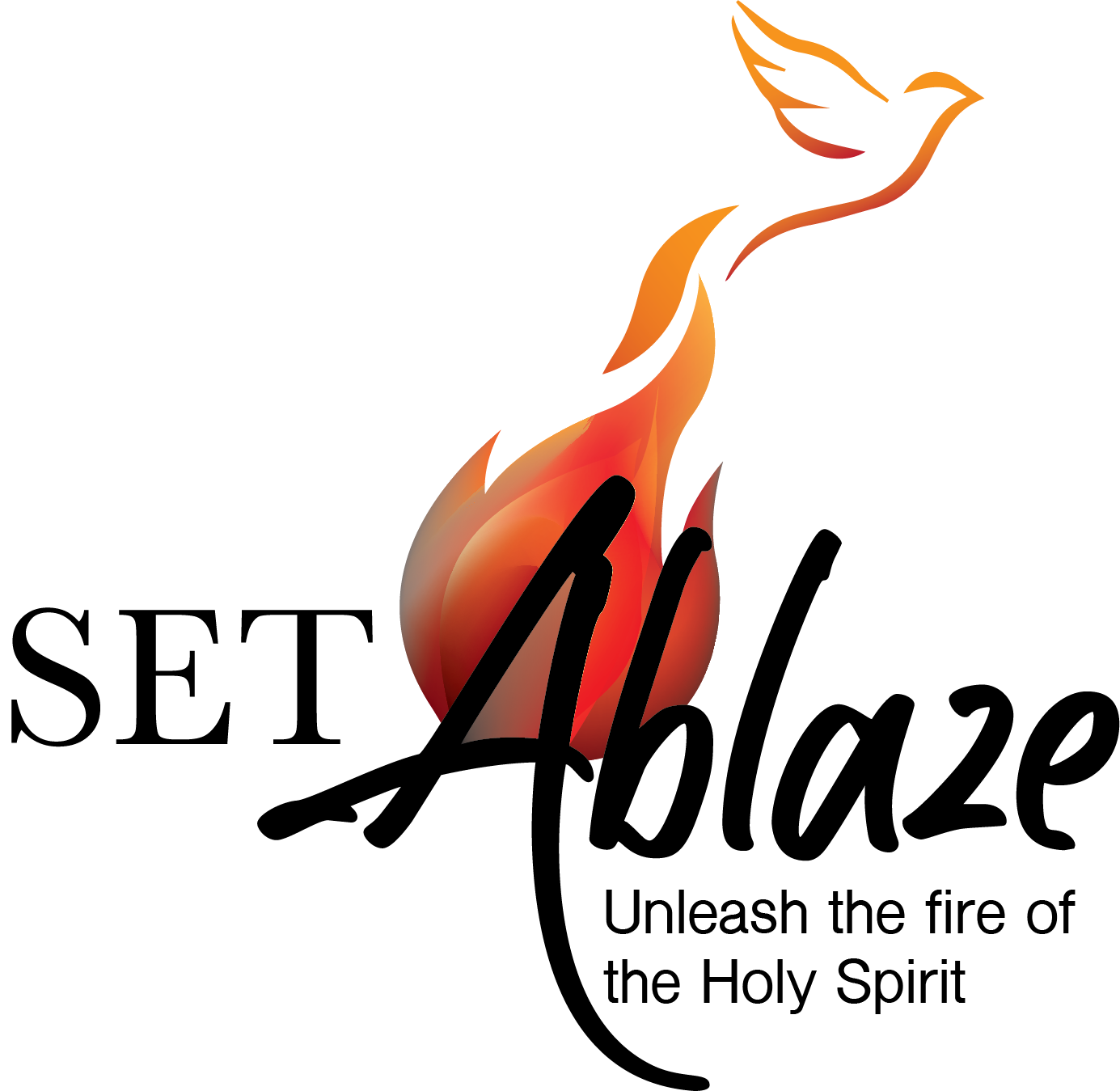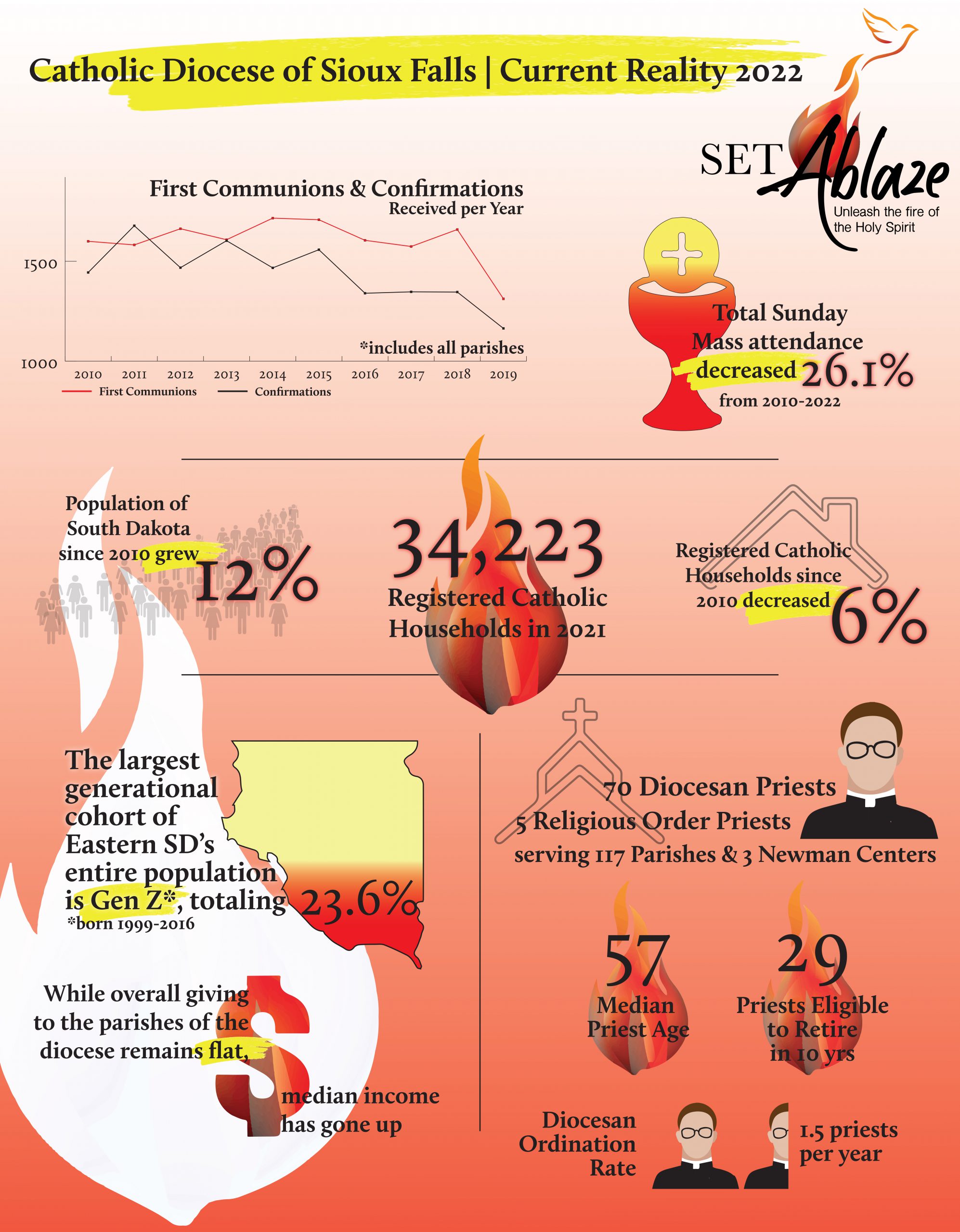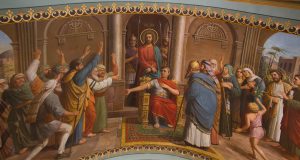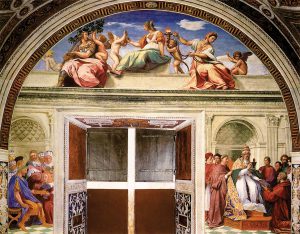
By Renae Kranz
We are living in a time of great division, a time when serious religious practice is often looked down upon by the rest of the world. Our culture has become more secular, more hostile. We can no longer go with the flow of our society and expect to grow in our faith, or even have any faith at all. The age of Christendom is gone; the age of apostolic mission is here.
What does that mean for us?
For many of us, it will first mean rethinking what we prioritize in our lives. Do we spend too much time on everything except our faith? Do our lives center around sports, work, social media, material gain, pleasure or the pursuit of perfection? Have we made comfort our god?
This is not what God wants for us, and it’s definitely not what he made us for. We were made to be in a relationship with him and in community with those around us. The center of our lives is meant to be God and his Church, our families (the domestic church) and the Catholic community that surrounds us. But that’s not all.
Living in an age of apostolic mission means we must work harder at being Catholic, much like the apostles did. They had little to no advantage when it came to evangelizing the world in their time, and yet they did it. They put God smack dab in the center of everything they did, and those who came into their orbit saw it and wanted it for themselves.
They reached out to people in surrounding areas and converted thousands of people, people who were completely unfamiliar with the Gospel (not unlike today). That’s what apostolic mission looks like. And now it’s our turn.
Our culture no longer thinks with a Christian ethos or Christ-centered mind-set. It’s absolutely foreign to many. We are the new disciples on apostolic mission. This means we must look at everything with new eyes: our diocese, our parishes, our families and our own hearts. We must become missionary disciples who have been Set Ablaze with the love of the Holy Spirit.
Part of this “looking at everything with new eyes” means we have to plan carefully for the future of the Diocese of Sioux Falls. If you did not read Bishop DeGrood’s column at the beginning of this issue of The Bishop’s Bulletin, please read it now and then come back and continue with this feature. If you have already read his column, keep reading and I will try to fill in some of the gaps as to what the next six months to two years of structural and pastoral planning will look like.
Why now?
This is the key question every Catholic should be asking: Why are we doing this now?
Along with the data collected by various diocesan offices earlier this year, we also already know some key realities about our diocese and the parishes and Catholics in it. Let’s take a look at some of the “why’s” when it comes to discerning a new path.
We are a diocese with a rich history of faithful and resilient Catholic people committed to the Church, their faith, their families and the local parish.
Since the establishment of the diocese in 1889, rural and urban parishes have dotted the landscape of Eastern South Dakota. Over the course of our history, some 302 parishes have been erected. Today, 117 remain—a sign of continuous change. Though the parish landscape has changed, the faith of the Catholics in those parishes has remained an enduring legacy of the prairie we inhabit.
The Catholics east of the Missouri River have shown time and again that no matter what life throws at them, they find a way to unite with those around them and sustain their faith and their commitment to each other as people of God. Whether a new parish is being built in a growing area, or parishes are connecting to each other to share a pastor, the people in them have done their best to support their church, each other and their families.
We have strong financial positions in most of our parishes with a culture of good stewardship and a need for facility maintenance.
South Dakota Catholics are generous and careful with their money. This has left most parishes in strong financial positions; however, many of our facilities (parishes, rectories and schools) are in need of repair and constant upkeep. This can strain parish finances if there is not enough money left over or if planning is not in place to take care of the many Catholic buildings around the diocese.
As a diocese, we have all been invited to enter a life of missionary discipleship where we are healthy, happy, holy and hard-working faithful Catholics developing “fires”—pockets of missionary discipleship being practiced by the clergy and faithful.
God created us in his own image, and as he invites us into a relationship with him, we must also invite others into that relationship—the work of missionary discipleship. If we embrace the changes needed with boldness and an open heart, we can follow where the Holy Spirit is leading: to healthy, happy and holy lives where we unleash the fire of the Holy Spirit into our parishes and pastorates.
A clear need to invigorate the spiritual, pastoral and sacramental life of parishes and parishioners across the diocese and to disrupt a decade of downward trends in Mass attendance, reception of sacraments, and Catholic school enrollment.
For decades now, many Catholics have left the Church or have reduced their faith life to one hour on Sunday morning. This isn’t enough to sustain vibrant parishes and communities. Continuing down this path will only get us more of the same. Even as our population in Eastern South Dakota grows (up 12 percent), Catholics registered in parishes are down 6 percent and enrolled in schools are down 7.4 percent. As baptized Catholics, we have a responsibility to disrupt these trends through our own efforts to share our faith.
We break those trends by recommitting ourselves to our Catholic faith, realigning our priorities by placing God back at the center of our lives, and bringing the vision of missionary discipleship to life in our diocese. Only by revitalizing our parishes and families can we become the missionary disciples God wants us to be. This vision needs committed Catholics spread throughout the diocese helping others come to know Jesus.
A need for parishes to welcome, integrate and evangelize all peoples and cultures.
Have you ever heard someone new to the Catholic Church say they didn’t feel welcome at first? Yeah, me too. Even as a very welcoming state, we sometimes fall down on this and don’t always help new people (especially of cultures different than ours) feel like they belong. It can be a deterrent to joining the Church or to really becoming part of the parish community.
We can do better. Jesus welcomed all to his table. Let us redouble our efforts to make others feel welcome and invite them to become full members of our parish families.
There is a decline in active participation from laity in the local ministry of the church.
We all have busy lives, but we have for too long left the work of the parish to the priest or a small handful of dedicated people. This comes back to where we place our priorities. Are we putting God first when we do everything except help at our parish? It should be one of the first things we make time for.
Find time for your parish, in whatever capacity fits your gifts. There will be opportunities for all of us in the new pastorate structures. In the words of St. Francis, “It is in giving that we receive.”
There is a need to develop local parish culture and identity independent of the priest or pastor serving.
Because of the lack of involvement from laity in parishes (and at times an inability of priests to delegate), local parish culture and identity independent of the priest currently serving can become stifled. This can cause much upheaval whenever an assignment change occurs because the parish does not have a firm foundation among its parishioners with which to more easily transition from one priest to another.
A structure of our priests serving alone with a focus on administration over pastoral ministry is not healthy nor sustainable.
This is a well-known situation in our diocese, especially if you’re in a rural parish. We’ve seen our priests alone and isolated in some areas, while in other areas they are overly involved in administrative work rather than spending more time doing things such as visiting parishioners or hearing confessions. If we are to develop healthy, happy and holy priests (and therefore parishioners), we need to find ways to reduce these situations.
We acknowledge our need to organize our parish structures in ways that provide stability over at least 10 years.
If we don’t make major structural changes and plan for our future, we will find ourselves in crisis within 10 years. Twenty-nine (29) of our priests currently serving in the diocese will be eligible for retirement in 10 years. Structural changes to pastorates (one or more parishes organized with a single pastor and associate priests) now will set us up for less upheaval in parishes in the years to come.
We will also need to rethink our definition of “parish.” We will be stronger as a united Catholic community if we can let go of divisions between towns due to things like sports and other forms of competition between parishes and see each other instead as fellow missionary disciples in a world in need of the message of the Gospel.
Secularism in our world today is diminishing God’s presence and importance in our lives and is supported by our government’s efforts to supplant the role of the family and limit the presence of faith in our society.
This is a disheartening fact in the culture of our country. The diminishment of faith and God has not made our country better, and replacing the family with government will only lead us to tyranny. If we wish to be able to practice our faith and grow our families freely, we must turn to our Lord and each other to strengthen families and in turn our culture.
A good place to start in changing the culture is to increase our own knowledge and understanding of our faith, especially in areas where our culture is at odds with the Church. This renewing of our desire to learn can position us to help others understand and move toward conversion of thought, especially when it comes to topics around life, sexuality and science.
As numbers of priests have declined, sufficient practical experience gained during time as an associate has been limited due to priests being asked to take on roles as pastors sooner to fill assignments that would otherwise have been left open.
At times, priests have been hurried into roles they may not have been fully ready for, or they were not given the ideal training ground to perform well as a pastor. This often happened under the pressure to fill parish assignments rather than leave them open. It’s a cycle that has hit rural parishes especially hard.
A new structure of priests working together, where their strengths can be used to their best advantage, will build priests up and put parishes in a position to thrive.
There is duplication of ministry, services, staffing and resources across parishes within reasonable drive times.
Parishes near each other (especially those sharing a priest) have often kept their own secretaries, councils and other services. This has increased the heavy load of administration on priests, which sometimes prevents them from spending adequate time on sacramental and ministerial duties.
With a new structure of larger pastorates, it is possible to share staff or councils, or even ministries and communication efforts, which can ease the load on priests and parishioners alike.

What can we hope for?
Catholic dioceses around the country (and even in Europe) are making major structural changes to disrupt trends similar to what we’re seeing in our own diocese. As a Church, we must face this head on to bring the fruitful results of vibrant parishes and Catholics Set Ablaze with the fire of God’s love. This is what we are striving for as communities of Catholics:
- A new chapter of our rich tradition with new structures, a new call, new energy, and a focus toward growth rather than decline.
- Missionary discipleship, which needs to be clear, nurtured, supported and guided, is the compelling vision for the life of the Church.
- Healthy, happy, holy and hard-working priests and parishioners engaged in a personal relationship with Jesus Christ as missionary disciples.
- The use of parish and pastorate ministry and evangelization to reset the Catholic parish as a center of life for the faithful and the community
- Engaging, welcoming and impactful liturgies prayed in churches filled with people.
- Engage the local faithful who are most impacted by pastoral planning and know the parish best.
- Increase in vocations: priesthood, the diaconate, consecrated life and holy marriages.
- Reduce duplication of ministry, services, staffing and resources where reasonable through collaboration and delegation so priests can focus on pastoral ministry.
- Intentional development of newly ordained priests and the cultivation of assignments well-suited for their ongoing formation.
What we won’t do
There are a few parameters we have set of the things we will not do during this process:
- Knowingly or willingly violate canon or civil laws or diocesan policy.
- Leave clergy, staff and lay faithful feeling unsupported or without development or resources.
- Use technology to replace full, active participation of the faithful in the celebration of the Mass.
- Protect the status quo in one area while ignoring clear facts and trends, or use influence or reputation to protect another area from making necessary changes that are asked of all.
- Exceed three weekend Masses per priest, not including funerals and weddings.
A future full of hope
This is a time for all of us as Catholics who love God to come together and answer the call of our time. This call is one of apostolic mission, of a renewed faith and commitment to what Jesus said when he called us to the Great Commission: “Go, therefore, and make disciples of all nations, baptizing them in the name of the Father, and of the Son, and of the Holy Spirit” (Mt 28:19).
This will not always be easy and likely will push us out of the comfort we have grown accustomed to, but Jesus tells us over and over in Scripture to “be not afraid.” In fact, right after his transfiguration, the apostles with him had fallen to the ground in fear. Jesus says to them, “Rise, and do not be afraid” (Mt 17:7). He says this to us now as well. We must rise from our slumber, allow the Holy Spirit to set us ablaze with fervor for our faith, and then unleash that fire of the Holy Spirit so that others may be converted.
The changes we will be making, coupled with continued efforts toward Lifelong Catholic Missionary Discipleship Through God’s Love, will set us on a path to have the fire of the Holy Spirit Set Ablaze in our hearts. Then it is up to us as the people of God to go out and unleash that fire, that love of God, so that all around us will know we are His and be drawn to Christ through the power of the Holy Spirit.
Be Set Ablaze! Unleash the fire of the Holy Spirit!


